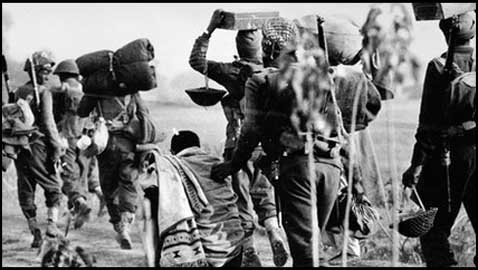Stains of Blood on our History
So, relentless was the end of love, so heartless—
After the nights of tenderness, the dawns were pitiless, so pitiless (From Faiz’s Dhaka say Wapsi par;translation by Agha Shahid Ali)
History of nations, big or small, is stained with blood; blood of those who fought for glory and of those who resisted their quest of glory. The history of Pakistan is no different. Every year, with the coming of December, the ghosts of past, come out of the shadows and haunt us. The fall of Dhaka or the debacle of Dhaka, creates a national melancholy; and no matter how hard we try to wash away the stains of blood on our history, they will stay, reminding us of the great tragedy that this country had to face. It is still argued that the turn of events made the separation of our erstwhile eastern wing unavoidable, but there has to be someone responsible for that lamentable episode. It is also an unfortunate fact, that the separation of East Pakistan, is confined to the six points of Mujib ur Rehman in our textbooks, and not much debate and discussion exists at present in our schools and colleges over this issue, so one has to go through other books available on the subject. I came across Sarmila Bose’s Dead Reckoning last year, and recently, Shahid Hussain’s What was Once East Pakistan, so my learning of the subject is based upon the study of these two books.
While everybody knows that Sheikh Mujib’s Awami League secured 160 out of 162 seats, not many people are aware that the voting percentage was 56% in the East Pakistan as compared to 58% in Sindh and 67% in Punjab. Awami League got about 46% of the votes cast in the elections, which means that the majority of the voters of the Eastern wing either didn’t support Awami league or were just not concerned about the outcome of elections. In either case, the voting percentage doesn’t show that the majority of Bengalis wanted secession, at least, before the commencement of the notorious Operation Searchlight on 25th March, 1971.
When Yahya Khan announced the postponement of National Assembly session, which was due to meet on 3rd March, chaos erupted in parts of the eastern wing. Mujib wanted an immediate transfer of power to the rightful elected majority party but the incumbent military junta and for that matter; Bhutto wanted a settlement with Mujib prior to the assembly session. Some people blame Bhutto for his intransigence and lust of power, citing his oft-repeated threat that he would break the legs of any politician who would try to attend the assembly session in Dhaka. But one needs to consider that Bhutto was just a politician, it is true that he had a great following in the western wing but military was at the helm of affairs, it would have made sure that anybody who tries to disrupt the political process is dealt with iron hands. Moreover, Bhutto’s threat could be taken as a move to gain political leverage in negotiations with Mujib.
Similarly, the military is blamed by some as the sole cause of the separation of East Pakistan. While, it is true that military over the years, had trampled upon the constitution of Pakistan and didn’t let the political process to strengthen and gain ground, but the secessionist tendency in the East was never a military’s doing. It was Mujib ur Rehman’s parochial politics and his ability to play the nationalist card well before the aggrieved Bengalis, who saw in him a leader and a hope for a better future. Mujib, well aware of the historical deprivation of East Bengal, instilled the masses with bitterness and hatred against the Army and West Pakistan. Mujib’s intentions about the well-being of Bengalis can be argued upon but the way he chose to attain those means was severely wrong, and no nation can tolerate treachery and deceit. He kept on denying his involvement in the Agartala conspiracy case, but on February 22 2011, one of the surviving conspirators Deputy Speaker Shawkat Ali, admitted that the allegations of Agartala conspiracy case were true and they indeed sought India’s help to secede from West Pakistan.
Sheikh Mujib’s avowed love for democracy became clear when he became the president of Bangladesh, and banned all political parties and most newspapers, except the state owned ones. The seeds of hatred and rebellion which he sowed, soon took another shape, when on August 15th,1975, junior Army officers of Bangladesh Army stormed the presidential residence and killed him and every one of his family present there.
Fate has its own ways of taking revenge, If Pakistani military regime wanted, it could have killed him, while he was in Rawalpindi jail, on the night of 16th December, 1971.But he was released and flown into the newly created state of Bangladesh, where some years later he met the end, a traitor deserved.

